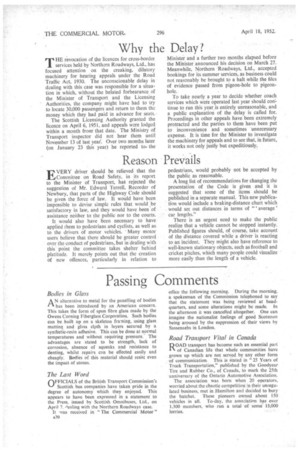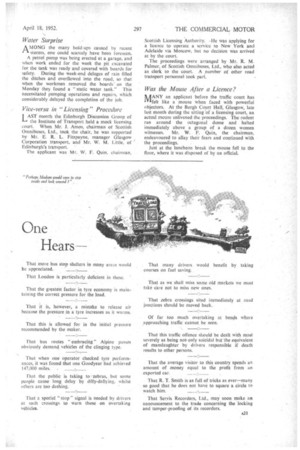Passing Comments
Page 22

Page 23

If you've noticed an error in this article please click here to report it so we can fix it.
Bodies in Glass
A N alternative to metal for the panelling of bodies
has been introduced by an American concern. This takes the form of spun fibre glass made by the Owens Corning Fiberglass Corporation. Such bodies can be built up on a skeleton framing, using glass matting and glass cloth in layers secured by a synthetic-resin adhesive. This can be done at normal temperatures and without requiring pressure: The advantages are stated to be strength, lack of corrosion, absence of squeaks and resistance to denting, whilst repairs can be effected easily and cheaply. Bodies of this material should resist even the impact of stones.
The Last Word
OFFICIAIS of the British Transport Commission's Scottish bus companies have taken pride in the degree of autonomy which they enjoyed. This appears to have been expressed in a statement to the Press, issued by Scottish Omnibuses, Ltd., on April 7. 'eating with the Northern Roadways case.
It was received in "The Commercial Motor" office the following morning. During the morning, a spokesman of the Commission telephoned to say that the statement was being reviewed at headquarters, and some alterations might be made. In the afternoon it was cancelled altogether. One can imagine the nationalist feelings of good Scotsmen being aroused by the suppression of their views by Sassenaehs in London.
Road Transport Vital in Canada
ROAD transport has become such an essential part of Canadian life that whole communities have grown up which are not served by any other form of communication. This is stated in "25 Years of Truck Transportation," published by the Goodyear Tire and Rubber Co., of Canada, to mark the 25th anniversary of the Ontario Automotive Association.
The association was born when 20 operators, worried about the chaotic competition in their unregulated business, met in Hamilton and decided to bury the hatchet. These pioneers owned about 150 vehicles in all. To-day, the association has over 1,300 members, who run a total of some 13,000 lorries.
Water Surprise
AMONO the many hold-ups caused by recent storms, one could scarcely have been foreseen. A petrol pump was being erected at a garage, and when work ended for the week the pit excavated for the tank was ready and covered with boards for safety. During the week-end deluges of rain filled the ditches and overflowed into the road, so that when the workmen removed the boards' on the Monday they found a "static water tank." This necessitated pumping operations and repairs, which considerably delayed the completion of the job.
Vice-versa in "Licensing" Procedure
AST month the Edinburgh Discussion Group of the Institute of Transport held a mock licensing court. When Mr. J. Amos, chairman of Scottish Omnibuses, Ltd., took the chair, he was supported by Mr. E. R. L. Fitzpayne, manager Glasgow Corporation transport, and Mr. W. M. Little, of Edinburgh's transport.
The applicant was Mr. W. F. Quin, chairman, Scottish Licensing Authority. -He was applying for a licence to operate a service to New York and Adelaide via Moscow, but no decision was arrived at by the court.
The proceedings were arranged by Mr. R. M. Palmer, of Scottish Omnibuses, Ltd., who also acted as clerk to the court. A number of other road transport personnel took part.
Was the Mouse After a Licence?
NAANY an applicant before the traffic court has ""felt like a mouse When faced with powerful objectors. At the Burgh Court Hall, Glasgow, late last month during the sitting 'of a licensing court, an actual mouse enlivened the proceedings. The rodent ran around the octagonal dome and halted immediately above a group of a dozen women witnesses. Mr. W. F. Quin, the chairman, endeavoured to allay their fears and continued with the proceedings.
Just at the luncheon break the mouse fell to the floor, where it was disposed of by an official.












































































